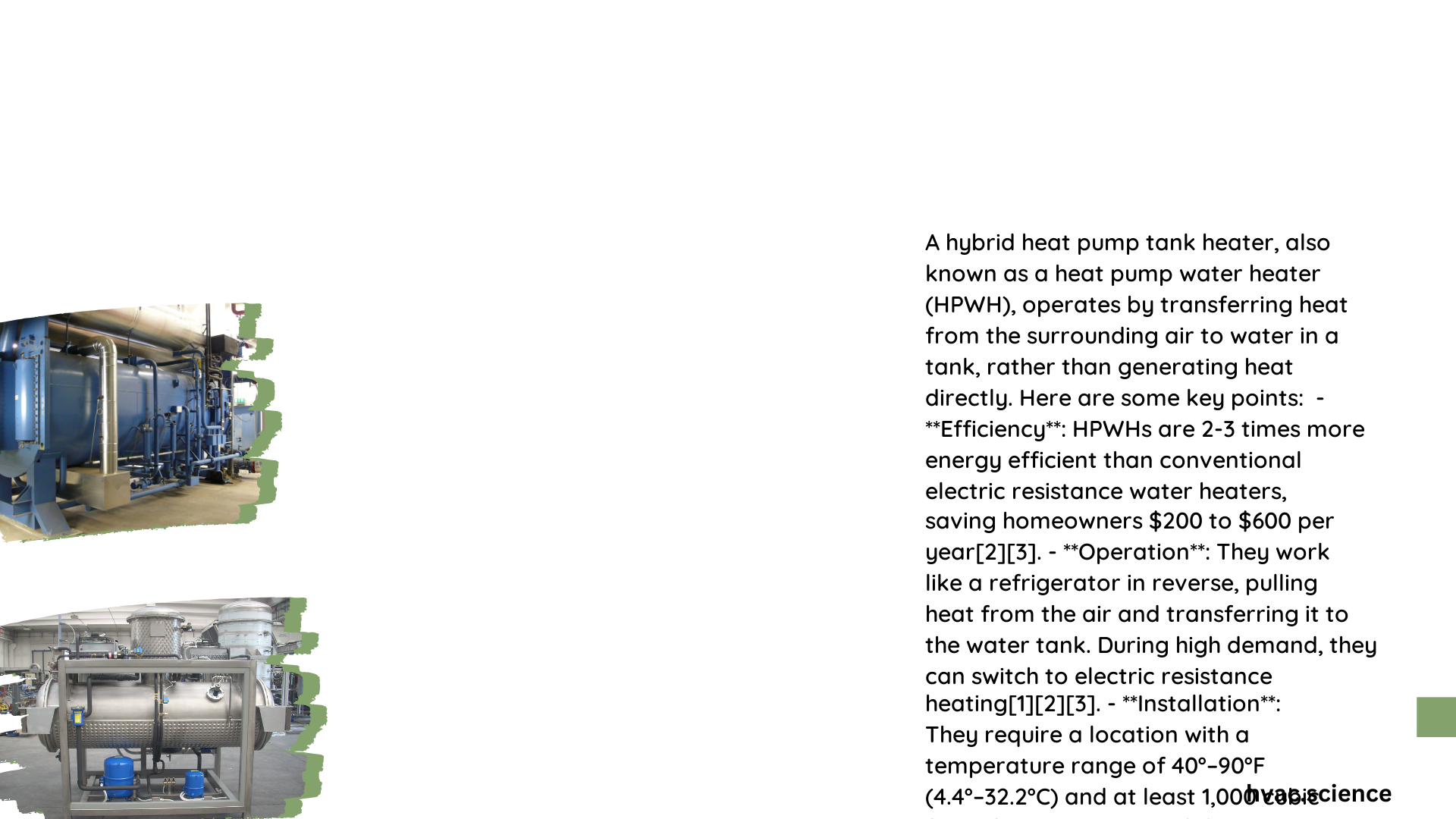Hybrid heat pump tank heaters are innovative water heating systems that combine the efficiency of heat pump technology with traditional electric heating elements. These units offer significant energy savings, improved performance, and environmental benefits compared to conventional water heaters. With capacities ranging from 40 to 80 gallons and Uniform Energy Factor (UEF) ratings up to 4.08, hybrid heat pump tank heaters are revolutionizing home water heating solutions.
What are the Key Features of Hybrid Heat Pump Tank Heaters?
Hybrid heat pump tank heaters boast several impressive features:
- High efficiency ratings (UEF up to 4.08)
- Significant energy savings (up to $600 annually)
- Various capacity options (40-80 gallons)
- First Hour Rating (FHR) up to 93 gallons
- Multiple operating modes for different needs
These features make hybrid heat pump tank heaters an attractive option for homeowners looking to reduce energy costs and improve their home’s efficiency.
How Do Hybrid Heat Pump Tank Heaters Work?

Hybrid heat pump tank heaters operate using two primary mechanisms:
-
Heat Pump Mode: The unit extracts heat from the surrounding air and transfers it to the water in the tank. This process is highly efficient and uses minimal electricity.
-
Electric Resistance Mode: When demand is high or ambient temperatures are low, the unit switches to traditional electric heating elements to ensure a consistent hot water supply.
This dual-mode operation allows the heater to optimize energy usage based on demand and environmental conditions.
What are the Capacity Options for Hybrid Heat Pump Tank Heaters?
Hybrid heat pump tank heaters come in various sizes to suit different household needs:
| Brand | Available Capacities (Gallons) |
|---|---|
| American Standard | 40, 50, 65, 80 |
| A. O. Smith | 50, 66, 80 |
The choice of capacity depends on factors such as household size, hot water usage patterns, and available installation space.
How Efficient are Hybrid Heat Pump Tank Heaters?
Hybrid heat pump tank heaters are known for their exceptional efficiency:
- UEF ratings range from 3.88 to 4.08
- Up to 4 times more efficient than standard electric water heaters
- Can save over $600 annually on energy costs
- Potential savings of $6,000 over a 10-year period
These efficiency metrics make hybrid heat pump tank heaters a cost-effective choice in the long run, despite higher initial costs.
What are the Installation Requirements for Hybrid Heat Pump Tank Heaters?
Proper installation is crucial for optimal performance of hybrid heat pump tank heaters:
- Space Requirements:
- Minimum 1,000 cubic feet (28.3 cubic meters) of air space around the unit
-
Installation location must maintain 40º–90ºF (4.4º–32.2ºC) year-round
-
Electrical Specifications:
- All-electric operation (no fuel combustion)
-
May require specific voltage (e.g., 120V for some models)
-
Plumbing Considerations:
- Proper water connections are essential
-
Some models offer side and top water connection options
-
Installation Costs:
- Higher initial costs compared to conventional water heaters
- Long-term energy savings offset the higher upfront investment
How to Maintain a Hybrid Heat Pump Tank Heater?
Regular maintenance is essential for the longevity and efficiency of hybrid heat pump tank heaters:
- Air Filter Cleaning:
- Frequency: Every 1-3 months
-
Importance: Ensures optimal performance and efficiency
-
Tank Flushing:
- Frequency: Annually
-
Purpose: Removes sediment and scale buildup
-
Professional Inspections:
- Frequency: Annually
- Benefits: Identifies potential issues early, ensures optimal operation
Proper maintenance helps avoid costly repairs and maintains the unit’s efficiency over time.
What Factors Affect the Performance of Hybrid Heat Pump Tank Heaters?
Several factors can impact the performance of hybrid heat pump tank heaters:
- Ambient Temperature:
- Optimal range: 40º–90ºF (4.4º–32.2ºC)
-
Lower temperatures may reduce efficiency
-
Water Usage Patterns:
- Consistent, moderate usage optimizes energy savings
-
High-demand periods may require electric resistance mode
-
Installation Location:
- Adequate air space is crucial for heat pump operation
-
Proper ventilation helps maintain optimal performance
-
Maintenance:
- Regular cleaning and maintenance ensure continued efficiency
- Neglect can lead to reduced performance and higher energy costs
Understanding these factors can help homeowners maximize the benefits of their hybrid heat pump tank heater.
How Do Hybrid Heat Pump Tank Heaters Compare to Conventional Water Heaters?
Hybrid heat pump tank heaters offer several advantages over conventional water heaters:
- Energy Efficiency:
- 2-3 times more efficient than standard electric resistance heaters
-
Lower operating costs despite higher initial investment
-
Environmental Impact:
- Reduced energy consumption leads to lower carbon footprint
-
No direct emissions from the unit
-
Versatility:
- Multiple operating modes adapt to different demands and conditions
-
Can switch to standard electric mode when needed
-
Long-term Savings:
- Significant reduction in energy bills over time
- Potential for $6,000 savings over 10 years
While the upfront cost is higher, the long-term benefits make hybrid heat pump tank heaters an attractive option for many homeowners.
By understanding the features, operation, and maintenance requirements of hybrid heat pump tank heaters, homeowners can make informed decisions about their water heating solutions. These innovative units offer a blend of efficiency, performance, and environmental benefits that position them as a leading choice in modern home water heating technology.
References:
1. Hybrid Heat Pump – American Standard Waterheaters
2. Smart Hybrid Electric Heat Pump Tank Water Heaters – A. O. Smith
3. ProLine® XE Heat Pump Water Heater – A.O. Smith Canada
